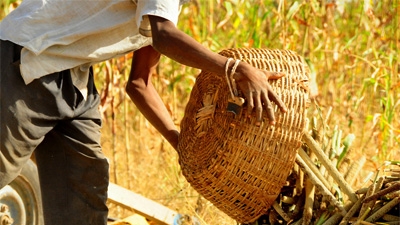BAMAKO, March 14, 2013. Although Mali has just emerged from a severe security and political crisis linked to the attacks by armed groups in the north of the country and the March 2012 coup, from a macroeconomic standpoint, the Malian economy has proved resilient so far. Such is the conclusion reached in the “Mali Economic Update,” a recent World Bank report on the Malian economy.
“In 2012, the increase in the prices of gold and cotton in international markets had a positive impact on the Malian economy given that gold represents 80 percent of the country's export earnings and a significant share of tax revenues, while cotton is the second largest export,” asserts Cheikh Diop, a World Bank economist in Bamako and the author of this report.
Although the country posted a 1.5 percent or 1.2 percent contraction of its real GDP, according to the most recent estimates dated March 2013, the negative impact of the political situation on economic activity was considerably mitigated by a dramatic rebound in agricultural production in 2012 (+14 percent) as well as an increase in gold production (+9 percent). “Without this confluence of exogenous factors, the decline in GDP would have been much more drastic,” states Cheikh Diop.
However, sectors such as tourism and hospitality have borne the full brunt of the effects of the political and security crisis, with the construction and public works sector plunging 35 percent and tourism-related services posting a decline on the order of 40 percent, according to the most recently available data.
Yet, although the economic outlook depends, in the short term, on the progress on the ground of the political and security situation, the growth rate should return to its trend level of around 5 percent in 2013, the report estimates. However, GDP is expected to remain well below its potential level in the wake of the shocks endured by the economy in 2011 and 2012.
With respect to the business climate, Mali dropped five spots in the most recent Doing Business ranking (DB 2013), falling to 152nd place of the 185 economies reviewed, despite remaining the highest-ranked economy in OHADA and the WAEMU.
According to Cheikh Diop, in terms of priorities, economic recovery should support access to basic social services in order to mitigate the impact of the numerous shocks suffered by citizens over the past two years. As a result of the drought in 2011 and the political and security crisis of 2012, Mali's poverty rate has likely increased by 2 percentage points from its official level of 43.6 percent in 2010, based on estimates.
In 2011, Mali was ranked 175th out of 187 countries on the UNDP Human Development Index, which provides an overview of indicators such as life expectancy and education and income levels. However, progress made since the early 1990s has been limited owing to high population growth in Mali (+3.6 percent per annum on average).
“Likewise, the rehabilitation of administrative infrastructure and services could jump-start the construction and service delivery sectors,” highlights this report, which also notes that “the development of infrastructure that supports production, whether related to energy, agricultural development, or reducing the isolation of production zones, represents a major initiative.”
“One of the challenges facing Mali will be to diversify its economy. Although the country's agricultural potential is considerable, agricultural production continues to depend on rainfall. It is therefore necessary to develop irrigation mechanisms to reduce the country's vulnerability to climatic risks,” states Cheikh Diop, recalling that in 2011, drought affecting the Sahelian countries had a significant impact on agricultural production, which declined by 5 percent.
For its part, the World Bank is scaling up its activity with respect to the country's reconstruction efforts by focusing in particular on access by the Malian population to basic services. “Our priorities will be to consolidate the structural reform program established in recent years particularly with respect to transparency in public finance management, develop a social safety nets program, and support the diversification of agricultural production as well as strengthen productivity,” explains Cheikh Diop.

